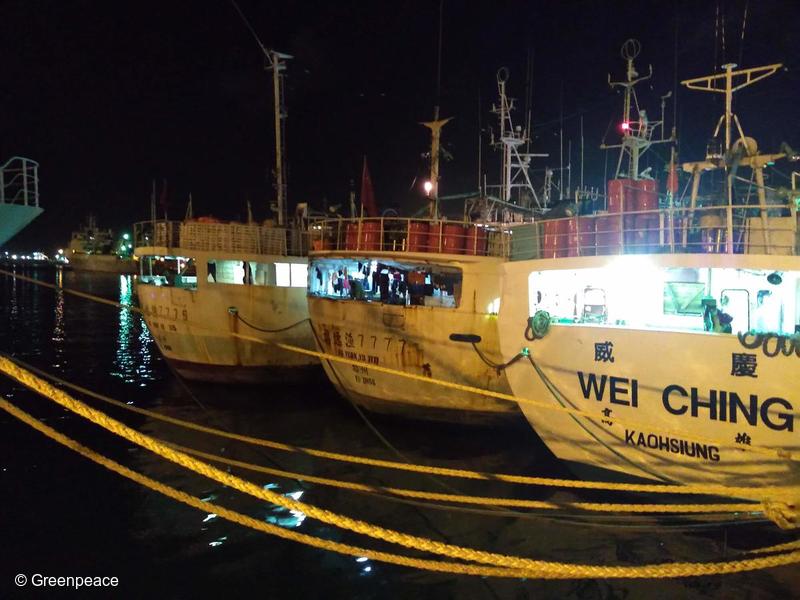DOWNLOAD THE REPORT
Taiwan is one of the world’s largest distant water fishing (DWF) powers, with over 1,100 Taiwanese-flagged vessels fishing across our oceans and hundreds more Taiwanese-owned vessels flagged to other countries.1 Taiwan is also home to Fong Chun Formosa Fishery Company, Ltd. (FCF), which has been ranked as one of the top three tuna traders in the world.23 FCF’s position as a global player was recently strengthened with the purchase of US canned tuna company Bumble Bee, further securing its place as a major supplier of tuna to consumers in the United States.4
In recent years, investigations have revealed shocking cases of human rights abuses in fisheries, including forced labour and human trafficking, and identified Taiwanese vessels and companies among the worst offenders. Even though the Taiwanese government has recently amended relevant regulations, progress has not been enough: both government and corporates continue to fail to protect the human rights of migrant fishers in the Taiwanese distant water fishing fleet. In Greenpeace East Asia reports Made in Taiwan (2016) and Misery at Sea (2018), Greenpeace East Asia documented the “laissez-faire” attitude from the Taiwanese Fisheries Agency (TFA) towards both illegal, unreported, and unregulated (IUU) fishing and human rights abuses, and pointed out the influential role FCF could play in eradicating these practices.
This report is based on a 2019 investigation conducted by Greenpeace East Asia, involving interviews with migrant fishers from three fishing vessels that were either flagged or linked to Taiwan. We found that IUU fishing and forced labour, allegedly, still continue to happen aboard Taiwanese fishing vessels operating in the Atlantic Ocean. The investigation indicates that violations of labour and human rights related laws seem to remain commonplace in Taiwan’s distant water fishing fleet, where over 20,000 migrant workers, most of whom are hired overseas from Indonesia and the Philippines, are employed.5 The labour conditions reported might violate relevant Taiwanese regulations and they fulfil seven of the eleven International Labour Organization (ILO) indicators of forced labour.
In interviews conducted with migrant fishers, Greenpeace East Asia found the fishing activities described indicate IUU fishing practices, namely related to shark finning and illegal transhipments. One fishing vessel, which has been accused of working conditions indicative of forced labour and IUU fishing, and one major carrier, which allegedly received catch from a fishing vessel suspected of forced labour and IUU fishing, are linked to FCF. In addition, Greenpeace East Asia analysed the automatic identification system (AIS) data of the fishing vessels, where available, and found that the catches could have made their way to the market either through transhipment at port or at sea. Together, these investigations suggest that FCF’s supply chains could be tainted with “modern slavery” and environmental destruction. Without greater oversight and protective measures in place, consumers in the main fish markets and elsewhere have every reason for concern that the seafood they buy may have been caught illegally, mixed with illegal catches or fished by workers subject to poor working conditions and even forced labour.
For many years, Greenpeace has been advocating that major seafood corporations, like FCF, lead and uphold global fishery reform. FCF has been upgrading and initiating environmental and social policies and programs, however FCF’s diffused and complex supply chain, and the many flags flown by vessels catching tuna for the company, make transparency of its supply chain all the more important. FCF must take more proactive and progressive actions, including enhancing the traceability of the seafood supply chain; source only from vessels that do not take part in transhipments at sea; strictly comply with international standards on human and labour rights and best practices; support legally binding agreements with labour unions; upgrade its sustainability policy; and establish concrete and effective action plans to demonstrate its tuna is caught legally and responsively, and the workers in its supply chain enjoy safe and just working conditions.
1. TFA. (2019, May 6). Legislations and Administrative Measures and for Overseas Employment of Foreign Crew Members. EU TAIEX Workshop on working and living conditions for fishers at the meeting of Ministry of Foreign Affairs, Council of Agriculture and Ministry of Labour, Kaohsiung, Taiwan.
2. Steven Adolf. (2019). A Sustainable, European Tuna Giant? Retrieved from
https://tunawars.net/tuna-wars-blog/bolton-nbspa-sustainable-european-tuna-giant
3. FCF’s annual revenue is up to NTD 45 billion (equivalent to USD 15 million), exceeding the NTD 40 billion (equivalent to USD 13 million) aggregate value of Taiwan’s distant water fishery products. Retrieved from Wealth Magazine. (2018). FCF: Taiwan’s Lead in Distant Water Fisheries. www.wealth.com.tw/home/articles/23154 and JieYu Chiang. (June 27 2019). Prime Minister Su Says, Alarm off, Taiwan’s 400 Million Value of Distant Water Fishery is Free from EU Yellow Card. ETtoday. Retrieved from https://www.ettoday.net/news/20190627/1476874.htm.
4. Greenpeace US( 2020) FCF must assure American consumers following Bumble Bee acquisition. Retrieved from https://www.greenpeace.org/usa/news/fcf-must-assure-american-consumers-following-bumble-bee-acquisition/
5. Fisheries Agency. (2019/12/31). The statistics of the foriegn crew on board Taiwanese fishing vessels. Retrieved from https://www.fa.gov.tw/cht/Announce/content.aspx


